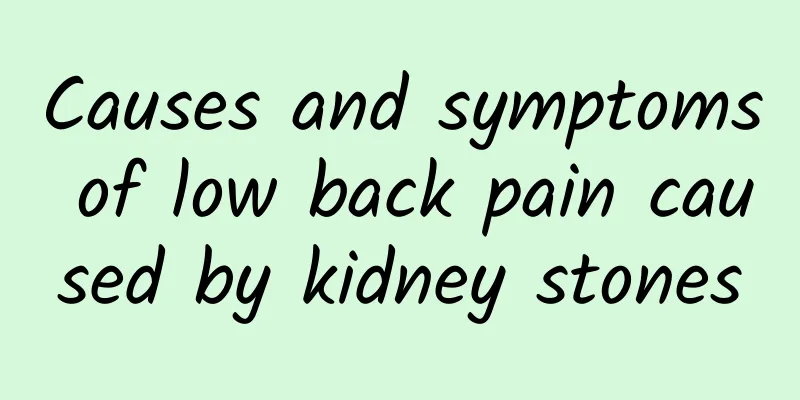Causes and symptoms of low back pain caused by kidney stones

|
Among the various causes of low back pain, low back pain symptoms caused by disease factors are also very common. Kidney stones are a common cause. So, what are the specific causes and manifestations of low back pain caused by kidney stones? Causes of low back pain caused by kidney stones: Pain is a common symptom of kidney stones. The pain of kidney stones is related to the location, shape, size, whether the kidney stones are active, the degree of obstruction, infection, etc. The pain of kidney stones can be roughly divided into colic and blunt pain. Both pain symptoms may occur at the same time, or only one of them may appear. If the kidney stones are relatively large, the pain experienced by the patient is mainly manifested as deep dull pain or dull pain. The symptoms of this pain may be caused by incomplete urinary tract obstruction of the renal pelvis, increased pressure in the renal calculus cavity, excessive tension of the renal capsule, etc., or it may be caused by local factors such as inflammation, edema, mucosal irritation, and increased peristalsis secondary to kidney stones. The pain site is mostly located in the waist ribs or lower back on the same side. Smaller kidney stones are easy to move in the renal pelvis or renal calculus, especially when they are entrapped at the renal pelvis outlet and the neck of the renal calculus, which can cause violent peristalsis of the ureter. Therefore, when the urinary tract is suddenly obstructed, renal colic is caused when the renal collecting system is pulled. When kidney stones cause back pain, it is often accompanied by gross hematuria or microscopic hematuria, with the latter being more common. Large amounts of gross hematuria are rare, and hematuria may worsen after physical activity. Patients with kidney stones may excrete sand and stones in their urine, especially when pain and hematuria occur, and the urine may contain sand or small stones. When stones pass through the urethra, they may cause obstruction or stinging. Symptoms of low back pain caused by kidney stones: The back pain caused by kidney stones is different from ordinary back pain and stomach pain. The pain caused by kidney stones occurs at a higher position, generally above the waist and on both sides of the lumbar spine. When the stones are inactive and the changes in the intrapelvic pressure are not obvious, it is usually an occasional dull pain or dull pain. When the kidney stones are active, colic occurs. In severe cases, the patient has difficulty standing up due to the pain, sweats profusely, and is accompanied by nausea and vomiting. Sometimes kidney stones move to the ureter and bladder with urine, and this pain will also reflect downward to the lower abdomen and inner thigh, accompanied by hematuria, frequent urination, urgency, and pain when urinating. |
<<: What are the main characteristics of visceral pain? These three are the most common
>>: Can crunches reduce belly fat? How?
Recommend
Three major treatments for eczematous dermatitis: Seize the best time for treatment
Eczematous dermatitis can occur anywhere on the h...
What causes pain in the lower right side of the abdomen in men?
Everyone hopes that their body is particularly he...
How to increase erection hardness and duration
Male friends are always dissatisfied with their s...
The structure and function of the testicles
Every person is born with many parts and structur...
What Chinese medicine to take for erectile dysfunction
Erectile dysfunction is the so-called impotence, ...
What to do with the small red bump under the glans
Many men seek medical help only when they feel di...
People who fail to quit smoking have this thought in their mind
Whether the original intention of smoking is to s...
What causes severe hair loss in men?
There are many reasons why men suffer from hair l...
What are the symptoms of male menopause?
Many men will experience a series of adverse symp...
Pearly rash inheritance
Pearly rash gets its name because after the onset...
How to make squid mouth, how to make squid mouth
Squid is a nutritious seafood with high content o...
Men's backs are always cold
Back coldness is generally considered to be a sym...
Why is it painful to have acne on the neck?
Acne usually appears frequently on people's f...
What to do if you have bad breath
Many white-collar workers are most afraid of bad ...
How to treat eczema acuminata? These treatments are the most common
For young and middle-aged people aged 18-50, ecze...









